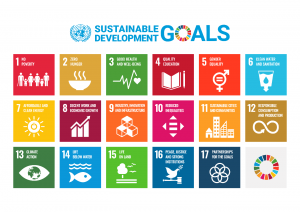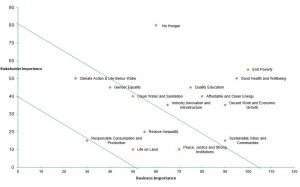Syed Ishaq Husain is a GP and GP Trainer at Grove Medical Centre.
Matthew Gitsham is a Professor of Sustainable Development and Director, Ashridge Centre for Business and Sustainability at Hult International Business School. He is on Twitter: @matt_gitsham
John McGuinness is a GP at Grove Medical Centre, North Lewisham PCN Fellow and RCGP Clinical Champion for Social Prescribing Lewisham. He is on Twitter: @drjohnpmcg
Society is facing significant challenges impacting on health. Covid-19, the climate crisis and widening health inequalities have all highlighted the need for general practice to engage, evolve and adapt if it is to meet these complex challenges. The United Nations Sustainable Development Goals (UNSDG) can be a tool for general practices to identify, prioritise and develop action for their own organisation.
Covid-19, the climate crisis and widening health inequalities have all highlighted the need for general practice to engage, evolve and adapt.
The recent “Build Back Better” report crystallises what general practitioners already know – the impact of social factors on health. Exposed by Covid-19 and other global events the challenges to health are numerous and require a societal response. The inclusion of air pollution on the death certificate of Ella Adoo-Kissi-Debrah, a young girl who had a fatal asthma attack in 2013, local to our own practice in Lewisham, makes us understand the motives of Extinction Rebellion. The differential death rates from Covid-19, makes us understand the objectives of Black Lives Matter. The scourge of child poverty persists, with increased awareness due to Marcus Rashford’s campaign. Gender inequality persists, demonstrated by the existence of the Gender Pay Gap, exacerbated during Covid-19.
General practice is working beyond capacity, delivering the Covid-19 vaccination programme and providing “business as usual”. Despite this, general practice is demonstrating its irrepressible energy and commitment to innovation and evolution.
At a practice level, practices like Bromley by Bow Health Centre have demonstrated an understanding of the importance of societal challenges for many years. Nationally, initiatives such as embedding social prescribing, Green Impact for Health toolkit, Greener Practice and the BMA sustainable and environmentally friendly general practice report all demonstrate an understanding that general practice has a role to play, and actions we can take.
General practice has no choice but to respond.
Is responding to these challenges the work of general practice? General practice has no choice but to respond, aside from any moral argument. This is for a number of reasons:
- Regulatory: Reporting on the carbon footprint and gender inequality is a mandatory activity for many UK organisations. Whilst COVID-19 has temporarily reduced medico-regulatory demands, it is likely to be a matter of when, not if, that these activities will become mandatory for general practice.
- Reputational: A practice which actively engages with these challenges enhances its reputation.
- Recruitment and Retention: Staff in general practice want to see a broader purpose to their work, tackling societal challenges. This could influence recruitment with staff attracted to organisations that reflect this purpose.
- Financial return: Sustainable initiatives can reduce costs, e.g., reducing the carbon footprint by reducing energy consumption.
These problems are too large for general practice to tackle alone. We do not want to absolve individuals, businesses or government from their responsibilities. How can individual general practices engage with these challenges in a way that takes the uniqueness of their practice into account, develop their own map of this territory and navigate their own route through it, without being overwhelmed?
The Map and the Compass
The United Nations Sustainable Development Goals (UNSDG) can help. Sustainability is often used as a pseudonym for financial viability when mentioned in reference to general practice. The UN defines sustainability as “meeting the needs of the present without compromising the ability of future generations to meet their own needs”. In 2015, all UN member states adopted 17 UNSDG‘s “a universal call to action to end poverty, protect the planet and improve the lives and prospects of everyone, everywhere”. These describe the challenges that society faces in a comprehensive way, providing us with a map of the territory.

Figure 1: United Nations Sustainable Development Goals*
How can we determine the direction our individual general practices will take on this map, i.e. Which challenges should your practice prioritise? We suggest a sustainability materiality assessment can act as a compass. This involves three steps:
1) Identifying a ‘long list’ inventory of challenges relevant to your practice using the UNSDGs and other resources.
2) Engaging your practice’s key stakeholders to understand which challenges are relevant to them.
3) Combine this information to draw a Materiality Matrix (Figure 2), mapping the challenge’s impact on the practice against the level of interest to stakeholders, identifying a shortlist of key priorities. This clarifies which challenges and initiatives are of utmost importance to stakeholders and an individual general practice.

Figure 2: Example materiality matrix for a general practice
This process, already undertaken by larger NHS organisations, could be adopted by general practices to identify their own sustainable priorities, facilitate discussion between stakeholders and support developing their own plans for addressing them, incorporating actions from the initiatives described.
Each individual practice had its own values, vision and goals for the future. General practice has often demonstrated its capacity to evolve and ability to meet challenges when it is allowed to innovate, rather than respond to central diktats. Sustainability materiality assessments show a way to do this.
* Figure 1: United Nations Sustainable Development Goals graphic copyright UN, reproduced in accordance with UN rights and permissions policy.
Featured photo by Bill Oxford on Unsplash






